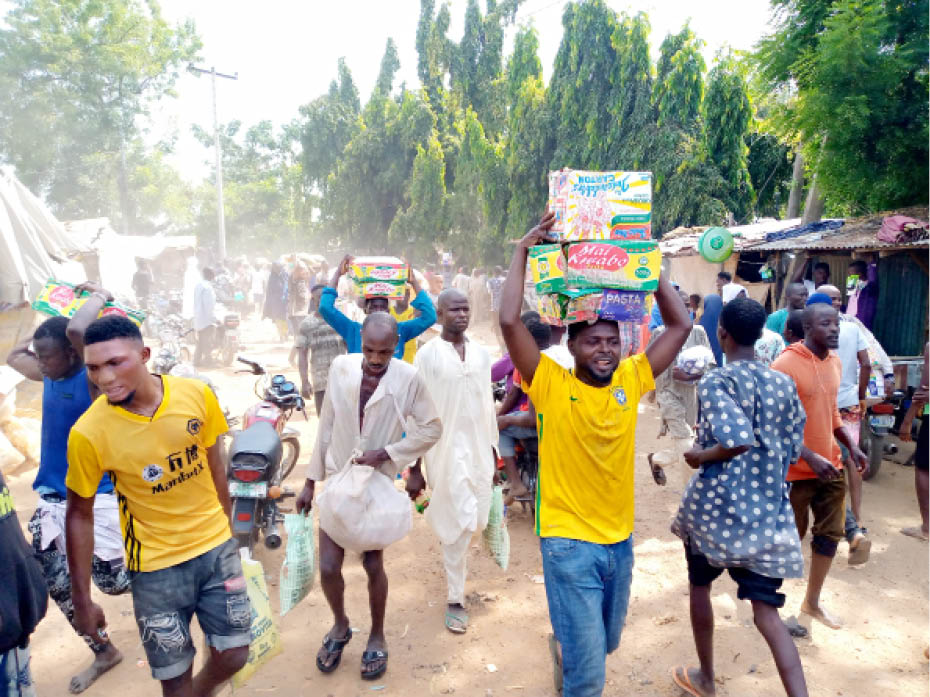The recent wanton destruction of storehouses and carting away of palliative materials by irate youths in several state capitals has assumed a frightening dimension and provided an urgency on retooling government logistics to alleviate the sufferings of the masses.
Contrary to claims by some analysts that the discoveries of warehouses were restricted to only states governed by the All Progressives Congress (APC), latest findings have clearly indicated that the failure of states to distribute relief materials to vulnerable members is hinged more on exigencies than an outright conspiracy to deny the vulnerable of society palliatives purchased by government.
Spokesman of the Coalition Against Covid-19 (CACOVID), Mr Nwanosiobi Osita, had explained in Abuja that the delay in timely distribution of relief material to states were caused by the “sheer scale of this nationwide food programme and the timing of the orders and deliveries, which coincided with the lockdowns and reduced movement across the country…”
With the end of the #EndSARS protests, the desperate members of society and some irate youths had turned their attention to palliative warehouses; an act that was said to have been fuelled by political conspiracy for demonising state actors.
As at Sunday October 25, a palliative warehouse located in Jos, the Plateau State capital, belonging to former Speaker of the House of Representatives, Hon Yakubu Dogara, was discovered and ransacked by a crowd within a twinkling of an eye.
Not only was another viral video clip showing a large warehouse containing palliatives in Jos, which had attracted thousands of people that thronged the warehouse for relief materials, traffic was brought to a standstill, forcing Governor Simon Lalong to re-imposed a 24-hour curfew in the entire state to avoid mayhem taking over the city. Some state capitals, including Jalingo, Enugu and Abeokuta, among others, also witnessed a share of violence as youths and other groups participated in looting relief materials.
In Kaduna, a warehouse at Gwari Avenue in Barnawa-Kaduna was attacked after youths reliably learnt that Covid-19 relief materials meant for vulnerable people had been stored there. Within a short time, crowds of youths and other groups invaded the warehouse and virtually turned the property into a skeleton.
Like it was done in some states, in a bid to stave off further breakdown of law and order, the Kaduna state government under Governor Nasir Ahmad el-Rufai swiftly imposed a 24-hour curfew on some parts of the state. Responding to security reports that looting of warehouses may soon engulf the entire state, the state government quickly extended the curfew to all parts of the state.
The attack on the Barnawa warehouse has led to several narratives, including an allegation linking the ownership of the warehouse to one of the hard working commissioners of the el-Rufai’s government, Mr. Thomas Gyang. He is accused to have secretly stored these materials for future political activities. But this allegation seems flawed as highly-placed sources both the Kaduna State government and the commissioner himself have confirmed that the relief materials belonged to Chikun Local Government Area of the state and meant for distribution to beneficiaries.
The state broadcast by the Kaduna state Deputy Governor Dr Hadiza Sabuwa Balarabe has absolved Mr Gyang of any complicity as she explained that the looted relief materials were for vulnerable persons after a painstaking identification of beneficiaries. In her words: “One of these lessons is about better targeting of beneficiaries in order to ensure fair spread across local governments. The local government coordinators and ward committees were tasked with identifying vulnerable persons in areas where the Social Register data was unavailable.”
Recalling some of the hiccups encountered during previous distribution of palliatives purchased by the state government for citizens in 23 LGAs in the state, Dr Balarabe explained that “new guidelines were included for CACOVID distribution at ward level to help ensure a fair spread and ease the movement of beneficiaries to pick the items. The items are bulky and it’s easier and cheaper for them to pick up at the ward level rather than centralized locations in the LGA.”
Since last Saturday after a warehouse containing relief materials was busted in Lagos, the nation’s security forces have been on red alert to ensure safety of warehouses. Members of both state and the National assemblies have been involved, in collaboration with security agencies, to ensure safety of these relief materials.
While commending Kaduna state and others for prompt responses to avert enthronement of violence, security attachments should be deployed to stores housing to ensure the safety of these relief materials. Efforts should also be geared towards the return to normalcy for people of the state.
Much as hunger is biting citizens amidst violence ripping across the land, government at all levels should work towards quick distribution of these relief materials by quickly overcoming the hurdles identified previously and ensuring that the real vulnerable members in dire needs are properly taken care.
Kabir, a public commentator, wrote in from Zaria

 Join Daily Trust WhatsApp Community For Quick Access To News and Happenings Around You.
Join Daily Trust WhatsApp Community For Quick Access To News and Happenings Around You.

